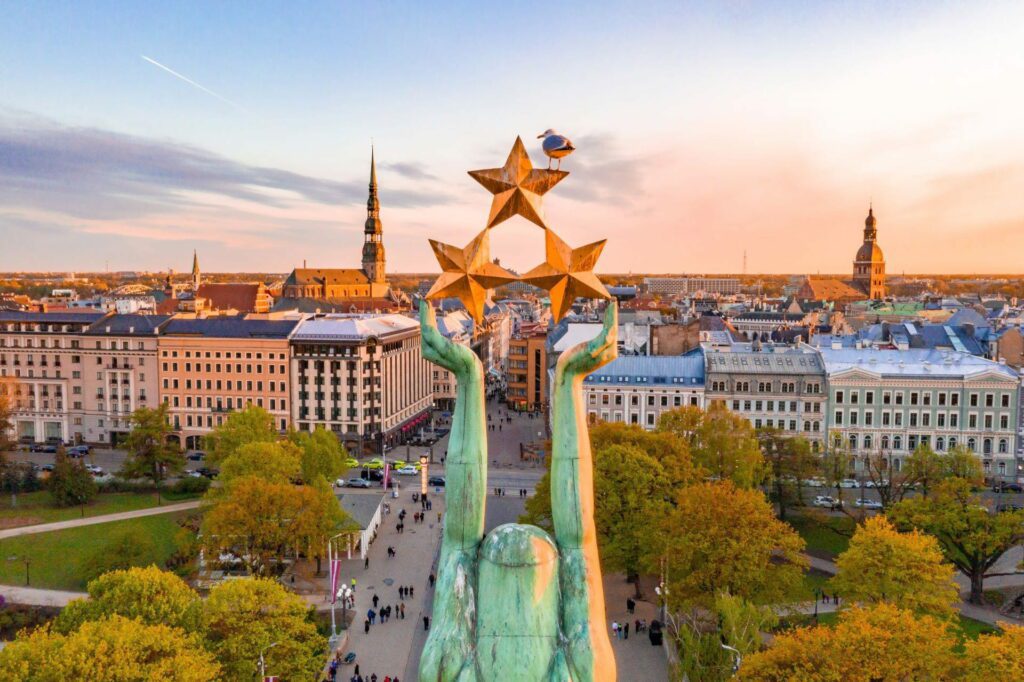Aerial view of Riga, capital and the largest city of Latvia.
Latvia is a former Soviet country located in the Eastern part of Europe with a population of 1.8 million people and a GDP per capita of $21,779 in 2022 (according to the World Bank). It gained its independence from the Soviet Union in 1991. After 50 years of Communist rule, the country faced challenges in establishing a democracy and entering the market economy. Today, after more than 30 years of independence, the philanthropic sector is emerging, and the people of Latvia are slowly embracing the new feeling of empowerment to engage in civil society and extending their philanthropic aspirations to people beyond their immediate family.
The nonprofit sector in Latvia has experienced vast changes since the collapse of the Soviet Union. There were only 50 nonprofit organizations in Latvia in 1991. The number grew rapidly in the following years. An important factor was that Latvian tax law that was established in 1995 allowed donors to make tax deductible donations to these organizations.
One of the major contributors to the development of civil society in Latvia was George Soros, a Hungarian-American billionaire investor, philanthropist, and political activist who has been known for his significant contributions to promoting democracy, human rights, and civil society in Eastern Europe through his Open Society Foundations. Other international institutions have also supported development of the nonprofit sector in the country, such as the World Bank, Queen Juliana Foundation, Charles Stewart Mott Foundation, and the European Free Economy Fund. However, since Latvia entered the European Union (EU) in 2004 and gained access to structural and cohesion funds, international donations to Latvia have substantially declined.
After joining the EU, a new Associations and Foundations Law was issued (since amended seven times). The law required all the previously considered community organizations to re-register under a status of association or foundation by December 31, 2005. All the organizations that failed to re-register by the due date were automatically erased from the database of the Register of Latvian Organizations. In addition, the Law on Public Benefit Organizations was issued in 2004 that gave nonprofit or charitable organizations that were established to serve the public good or benefit a particular community or cause (e. g. social welfare, humanitarian causes, education, culture, environmental protection, etc.) tax exemption privileges. That law has since been amended three times; the last amendment took place in 2022.
The number of civil society organizations in Latvia reached close to 27,000 in 2023. However, a recent study by the Civic Alliance – Latvia, found that only 50% of them were active, and only 16% of the active ones received donations in 2022 that consisted of EUR 97.7 million. This accounted for 17% of all the sector’s income. The other income categories included government funding EUR 111 million (19%), commercial activity – EUR 149,9 million (25%), foreign funding including the EU – EUR 51,1 million (9%), membership fees – EUR 52 million (9%), and other – EUR 127 million (21%).
Despite the growth of the nonprofit sector in Latvia, nonprofit organizations are not yet rooted in the everyday socio-cultural norms of society. The vast majority of NGOs in Latvia do not employ any people and those that do pay a salary of approximately EUR 6,000 per year per person on average, which is not sufficient to cover even basic survival needs. However, there are encouraging signs of informal philanthropy that can be illustrated by a strong wave of support for refugees from Ukraine. Many people opened their homes to the newly arriving families, providing food and shelter to them for many weeks and sometimes months until formal government support was in place. Also, a dramatic increase in donations by individuals in 2022 (by 63%) and a general increase in NGO income by 22% in comparison to the previous year (according to Civic Alliance – Latvia), indicated that formal philanthropy also strengthened during that year.
There is now hope that the new wave of caring and giving will ignite a stronger philanthropic spirit in Latvia. Despite various challenges that Latvia is still facing in promoting giving and strengthening civil society, it is obvious that the last 30 years have resulted in great progress due to tireless work of many individuals and institutions. In 2024, we can now say that Latvia does have a third sector and it has a real potential to thrive and grow. And while the formal nonprofit sector gains its power, Latvian people will continue engaging in informal philanthropy, supporting their family members and volunteering when there is need. Whether by giving a lift to a person with disability to attend a church service or by helping an elderly person to fill out a government form electronically, Latvians will serve and help as best as they can.
The views and opinions expressed in this article are those of the author and do not necessarily reflect the official views of the IU Lilly Family School of Philanthropy.
Author Bio:
Julianna Giannoutsou is a native of Latvia. She completed her PhD in Philanthropic Studies from the Indiana University Lilly Family School of Philanthropy (then Center on Philanthropy). After, She returned to her native region in order to promote the concept of philanthropy in the Baltics. Julianna established the first Institute for Philanthropy in Lithuania affiliated with LCC International University where she currently serves as an Assistant Professor and a Senior Research Fellow.
Source link : https://blog.philanthropy.indianapolis.iu.edu/2024/04/11/the-nonprofit-sector-and-philanthropy-in-latvia/
Author :
Publish date : 2024-04-11 03:00:00
Copyright for syndicated content belongs to the linked Source.
